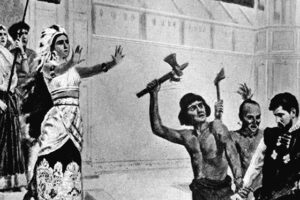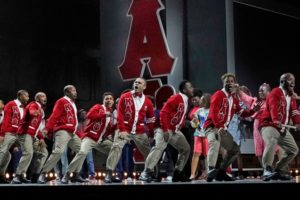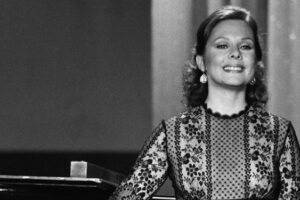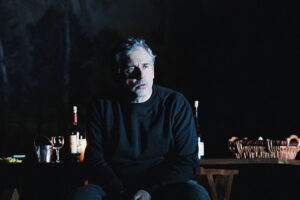

After the death of its conductor Robert Bass in 2008, the Collegiate Chorale struggled to find its way and last year changed its name to MasterVoices with a mandate to present opera and operetta in English at City Center under its music director Ted Sperling. Deborah Voigt starred as Ruth in its initial show, last fall’s The Pirates of Penzance by Gilbert and Sullivan.
An intriguing companion piece to Strauss’s Elektra currently playing at the Met, Purcell’s brief 1689 work tells of yet another disaster resulting from the Trojan War, and it would prove an even bigger challenge for this newly reconfigured group. As Dido lasts just 50 minutes, MasterVoices commissioned The Daughters of Necessity, a new prologue from noted Broadway composer Michael John LaChuisa.
Unfortunately LaChiusa’s 20-minute trifle depicting the three fates debating Dido’s destiny proved an arid appetizer to be endured than savored. Set to the composer’s own labored doggerel, it opened with a convincingly baroque-ish prelude but soon MasterVoices’s 80 members were discussing Dido’s fate in a raucous chorus full of broad topical references including the inevitable Donald Trump slam.
Dressed in drab work uniforms, Clark, Anna Christy and Sarah Mesko as Marta, Decima and Nona entered and began debating love’s destructive toll, particularly in the case of Dido’s short sad life. However, that discussion was soon overshadowed by Clark’s shtick of scissoring off bits of the enormous ball of red yarn which represented human life spans.
Each snip occasioned a member of the chorus (really one of the evening’s dancers) to fall dead to the floor in an elaborate pratfall which brought forth gales of laughter from the gala audience. However, it had grown painfully unfunny by the third iteration.
Although it must have been necessary to supplement the Purcell to fill out the evening, who could have possibly thought this low not-ready-for-Broadway sketch would be an appropriate curtain-raiser for one of opera’s most elegantly touching works? It was intensely jarring when just moments after the curtain came down on the brash LaChiusa that Sperling launched into Dido’s delicate and hypnotic overture.
His tempi for the 20-member Orchestra of St. Luke’s throughout the Purcell were generally apt but revealed no particular feel for the niceties of 17th century music. He also made some odd decisions throughout about repeats and instrumentation and I have definitely heard OSL play baroque music more idiomatically on many occasions.

Of the three “real” opera singers in the cast, Christy was a delightful Belinda, singing with limpid clarity and tossing in a few apt ornaments. The dark mezzo of Mesko made an appealing contrast to Christy’s piquant soprano in their frequent duets but occasionally Mesko sounded covered and strained at the top, especially in the haunting “Oft she visits.” Handsome baritone Elliot Madore made a particularly amorous Aeneas who could barely keep his hands off his beauteous Dido. Unfortunately he struggled with the vocal amplification (though tastefully and modestly done) sounding muffled and cautious.
Clark’s lean and decidedly un-operatic mezzo revealed the evening’s primary vocal weakness, but she offered a sizzlingly flamboyant portrayal of the Sorceress whose vendetta against Dido stems from pure malevolence. Doug Varone who both directed and choreographed the evening used Clark’s admirable plastique incorporating her into several dance numbers in which she and her dark followers celebrated their evil-doings with élan. She also got to model two of Christian Siriano’s most eye-catching gowns—a riot of black feathers followed by a sleek number of flaming crimson.
Eight lithe members of Doug Varone and Dancers unobtrusively moved about the simple elements of David Korins’s production design—several chairs and a large table on wheels—while ably impersonating both Dido’s and the Sorceress’s followers. Except for some over-the-top snarling and goofy “wicked” gesturing for the chorus, Varone’s production told the story simply but effectively which was particularly helpful as there were no surtitles. However, the soloists’s diction throughout was so extraordinarily clear that one rarely lost a word of Nahum Tate’s eloquent text.
Whereas one had to make some allowances for Clark’s vocal shortcomings, none were needed for O’Hara who may at first have seemed an unexpected choice for Dido. Although the role has been sung by sopranos as disparate as Kirsten Flagstad and Emma Kirkby, Dido—with its low-ish tessitura and slow, mournful music—is most often taken these days by a mezzo. But O’Hara immediately made it sound completely right, always in command from secure glowing high notes to a warm and luminous middle.
Looking ravishing in pale lavender, O’Hara began her first great number facing away from the audience preoccupied by her paralyzing sadness. The sheer candor of her singing was gripping, and one gasped as she melted at Aeneas’s reckless ardor. After the fetching aqua gown for her brief happy moment in the second act, she arrived to dismiss the fickle Trojan clad all in black, stoic with heroic resignation. Although the poignant isolation of her suicide was somewhat diluted by Varone’s danced conclusion which encircled Dido with eight followers, O’Hara entered effortlessly into that wrenching dance achieving a moving apotheosis.
While Broadway is lucky to have such an accomplished singer as one of its premiere stars, Dido and last season’s Valencienne in Lehar’s The Merry Widow at the Met suggest that O’Hara should keep exploring opera—one hopes that MasterVoices might have something in store for her in future seasons. In the meantime, in October the group will present the New York premiere of 27, Ricky Ian Gordon’s recent opera about Gertrude Stein and Alice B. Toklas starring Stephanie Blythe and Heidi Stober.
Photos by Erin Baiano























Comments